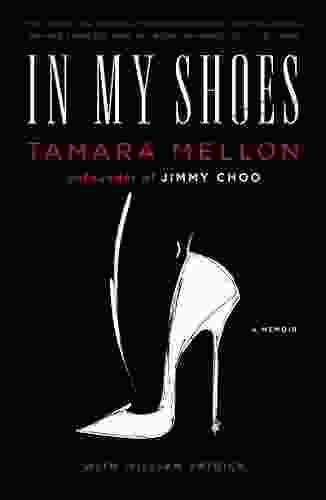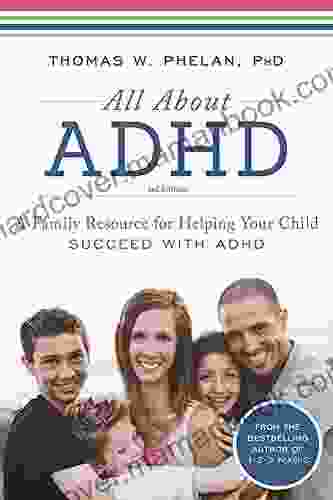Unlocking Success for Children with ADHD: A Comprehensive Guide for Parents

Attention Deficit Hyperactivity Disorder (ADHD) is a neurodevelopmental condition that affects millions of children worldwide. It can present challenges in various aspects of a child's life, including academic performance, social interactions, and emotional well-being. As a parent, navigating the complexities of ADHD can be overwhelming, but with the right resources and support, you can help your child succeed and thrive.
4.7 out of 5
| Language | : | English |
| File size | : | 1032 KB |
| Text-to-Speech | : | Enabled |
| Enhanced typesetting | : | Enabled |
| Word Wise | : | Enabled |
| Print length | : | 236 pages |
| Screen Reader | : | Supported |
Understanding ADHD
ADHD is characterized by difficulty paying attention, impulsivity, and hyperactivity. Children with ADHD may have trouble focusing on tasks, staying organized, and following instructions. They may also be restless, fidgety, and easily distracted. These behaviors can lead to academic struggles, social difficulties, and low self-esteem.
It's important to understand that ADHD is not a behavioral disorder. It is a neurological condition that affects the way the brain processes information and controls behavior. With proper diagnosis, treatment, and support, children with ADHD can learn to manage their symptoms and reach their full potential.
Educational Resources and Support
One of the most important aspects of supporting a child with ADHD is providing them with the right educational resources and support. Here are some key strategies:
- Seek a comprehensive evaluation: A thorough evaluation by a qualified healthcare professional can help determine the severity of your child's ADHD and rule out other underlying conditions.
- Develop an Individualized Education Program (IEP): An IEP is a tailored plan that outlines specific accommodations and support services your child needs to succeed in school. This may include extra time on tests, preferential seating, or specialized tutoring.
- Collaborate with teachers and school staff: Open communication with teachers and staff can help ensure your child's needs are being met in the classroom. Share information about your child's ADHD and work together to develop strategies that support their learning.
- Explore educational interventions: There are various evidence-based educational interventions that can help children with ADHD. These include cognitive behavioral therapy (CBT),behavioral therapy, and social skills training.
Behavioral Strategies
In addition to educational support, behavioral strategies play a crucial role in managing ADHD symptoms. Here are some effective techniques:
- Establish clear rules and expectations: Children with ADHD need to know what is expected of them. Set clear rules and boundaries and ensure they are consistently enforced.
- Use positive reinforcement: Reward your child for good behavior and effort. This can help motivate them to stay on track and encourage positive behaviors.
- Break down tasks: Large or complex tasks can be overwhelming for children with ADHD. Break them down into smaller, manageable steps to make them more achievable.
- Create a structured routine: Having a predictable routine can help children with ADHD stay organized and focused. Establish regular times for meals, homework, play, and bedtime.
Medication
Medication can be a helpful option for managing ADHD symptoms. Two main types of medications are used: stimulants and non-stimulants.
Stimulants: Stimulants work by increasing the levels of neurotransmitters like dopamine and norepinephrine in the brain. This can help improve attention and focus, reduce impulsivity, and control hyperactivity.
Non-stimulants: Non-stimulants have a different mechanism of action and work more slowly than stimulants. They can be helpful for children who do not respond well to stimulants or who have side effects from them.
It's important to note that medication is not a cure for ADHD. It can help manage symptoms and improve a child's ability to function in different settings. Medication should always be prescribed and monitored by a qualified healthcare professional.
Therapies
In addition to educational support, behavioral strategies, and medication, various therapies can help children with ADHD. These include:
- Cognitive Behavioral Therapy (CBT): CBT helps children identify and change negative thoughts and behaviors. It can teach coping mechanisms for managing ADHD symptoms and improving social skills.
- Behavioral Therapy: Behavioral therapy focuses on reinforcing positive behaviors and reducing problem behaviors. It can help children learn how to stay organized, manage their time, and interact appropriately with others.
- Parent Training: Parent training programs provide parents with the knowledge and skills to effectively support their children with ADHD. This includes learning about the condition, developing effective behavior management strategies, and advocating for their child's needs.
Challenges and Overcoming Obstacles
Raising a child with ADHD can present unique challenges. Here are some common obstacles and how to overcome them:
- Academic difficulties: Children with ADHD may struggle with paying attention in class, completing assignments, and staying organized. Work closely with your child's teachers to develop strategies that support their learning and provide them with additional help when needed.
- Social difficulties: Children with ADHD may have difficulty interacting appropriately with peers. Encourage them to join social groups and activities where they can develop social skills and build friendships.
- Low self-esteem: Children with ADHD often face criticism and negative feedback. Help them build self-esteem by focusing on their strengths and celebrating their successes.
- Parenting stress: Raising a child with ADHD can be stressful for parents. Seek support from family, friends, or support groups to manage stress and prevent burnout.
Fostering Strengths
It's important to remember that children with ADHD also have strengths. They may be creative, energetic, and have a unique perspective on the world. Here are some tips for fostering their strengths:
- Identify their interests: Children with ADHD often have strong interests. Encourage them to explore these interests and develop their talents.
- Provide opportunities for creativity: Creative activities can help children with ADHD express themselves and build confidence.
- Encourage physical activity: Physical activity can help children with ADHD burn off excess energy and improve focus.
- Build on their resilience: Children with ADHD may face challenges, but they can also develop resilience. Help them learn from their mistakes and focus on their progress.
Supporting a child with ADHD requires a comprehensive approach that involves educational resources, behavioral strategies, medication (if needed),and therapies. By providing them with the right support and guidance, parents can help children with ADHD overcome challenges, unlock their potential, and thrive.
Remember, every child with ADHD is unique. What works for one child may not work for another. Be patient, seek professional help when needed, and work together with your child to develop a plan that supports their specific needs. With the right approach, children with ADHD can achieve success in all aspects of their lives.
Additional Resources
- Centers for Disease Control and Prevention: ADHD
- Children and Adults with Attention-Deficit/Hyperactivity Disorder (CHADD)
- ADDitude Magazine
4.7 out of 5
| Language | : | English |
| File size | : | 1032 KB |
| Text-to-Speech | : | Enabled |
| Enhanced typesetting | : | Enabled |
| Word Wise | : | Enabled |
| Print length | : | 236 pages |
| Screen Reader | : | Supported |
Do you want to contribute by writing guest posts on this blog?
Please contact us and send us a resume of previous articles that you have written.
 Top Book
Top Book Novel
Novel Fiction
Fiction Nonfiction
Nonfiction Literature
Literature Paperback
Paperback Hardcover
Hardcover E-book
E-book Audiobook
Audiobook Bestseller
Bestseller Classic
Classic Mystery
Mystery Thriller
Thriller Romance
Romance Fantasy
Fantasy Science Fiction
Science Fiction Biography
Biography Memoir
Memoir Autobiography
Autobiography Poetry
Poetry Drama
Drama Historical Fiction
Historical Fiction Self-help
Self-help Young Adult
Young Adult Childrens Books
Childrens Books Graphic Novel
Graphic Novel Anthology
Anthology Series
Series Encyclopedia
Encyclopedia Reference
Reference Guidebook
Guidebook Textbook
Textbook Workbook
Workbook Journal
Journal Diary
Diary Manuscript
Manuscript Folio
Folio Pulp Fiction
Pulp Fiction Short Stories
Short Stories Fairy Tales
Fairy Tales Fables
Fables Mythology
Mythology Philosophy
Philosophy Religion
Religion Spirituality
Spirituality Essays
Essays Critique
Critique Commentary
Commentary Glossary
Glossary Bibliography
Bibliography Index
Index Table of Contents
Table of Contents Preface
Preface Introduction
Introduction Foreword
Foreword Afterword
Afterword Appendices
Appendices Annotations
Annotations Footnotes
Footnotes Epilogue
Epilogue Prologue
Prologue Sandra Harris
Sandra Harris Imogen Keeper
Imogen Keeper Wendi Friesen
Wendi Friesen Igor Nikolic
Igor Nikolic Nl Herzenberg
Nl Herzenberg Jenny Handy
Jenny Handy Mi Park
Mi Park Patrick Barnes
Patrick Barnes Christof Weber
Christof Weber Deborah Blum
Deborah Blum Kamalia Hasni
Kamalia Hasni Carlotta Gall
Carlotta Gall Don Lamont
Don Lamont Justin Payne
Justin Payne Karla Cornejo Villavicencio
Karla Cornejo Villavicencio Monae Everett
Monae Everett Evan Hundhausen
Evan Hundhausen Drew Karpyshyn
Drew Karpyshyn Jeremy Taylor
Jeremy Taylor Jennifer Chiaverini
Jennifer Chiaverini
Light bulbAdvertise smarter! Our strategic ad space ensures maximum exposure. Reserve your spot today!

 Anton ChekhovThe Ultimate Guide to Growing Hot Peppers: A Comprehensive Journey from Seed...
Anton ChekhovThe Ultimate Guide to Growing Hot Peppers: A Comprehensive Journey from Seed...
 Francisco CoxUnrelated: Undeterred: A Poetic Exploration of Identity, Belonging, and the...
Francisco CoxUnrelated: Undeterred: A Poetic Exploration of Identity, Belonging, and the... Shannon SimmonsFollow ·11.1k
Shannon SimmonsFollow ·11.1k Julio CortázarFollow ·17.3k
Julio CortázarFollow ·17.3k Ralph TurnerFollow ·13k
Ralph TurnerFollow ·13k Evan SimmonsFollow ·3.6k
Evan SimmonsFollow ·3.6k Chuck MitchellFollow ·16.1k
Chuck MitchellFollow ·16.1k Cortez ReedFollow ·11.4k
Cortez ReedFollow ·11.4k Ethan MitchellFollow ·9.7k
Ethan MitchellFollow ·9.7k Elliott CarterFollow ·7.8k
Elliott CarterFollow ·7.8k

 Eugene Powell
Eugene PowellComplete Guide to Using Yoga With Kids: Benefits, Tips,...
Yoga is an ancient practice that has been...

 Benji Powell
Benji PowellHow to Make $000 Per Week on Craigslist
Are you looking for a way to make extra money...

 Gabriel Garcia Marquez
Gabriel Garcia MarquezGrocery Row Gardening: The Exciting New Permaculture...
Kick-start your gardening journey with the...

 Hayden Mitchell
Hayden MitchellUnveiling the Gripping World of Winterwood: Ben Hood...
In the annals of crime thrillers, the...

 E.M. Forster
E.M. ForsterThe Financial Advisor Guide To Managing and Investing...
As a financial...

 Lee Simmons
Lee SimmonsIn My Shoes Memoir: A Poignant Journey of Resilience,...
In the tapestry of life, adversity often...
4.7 out of 5
| Language | : | English |
| File size | : | 1032 KB |
| Text-to-Speech | : | Enabled |
| Enhanced typesetting | : | Enabled |
| Word Wise | : | Enabled |
| Print length | : | 236 pages |
| Screen Reader | : | Supported |








